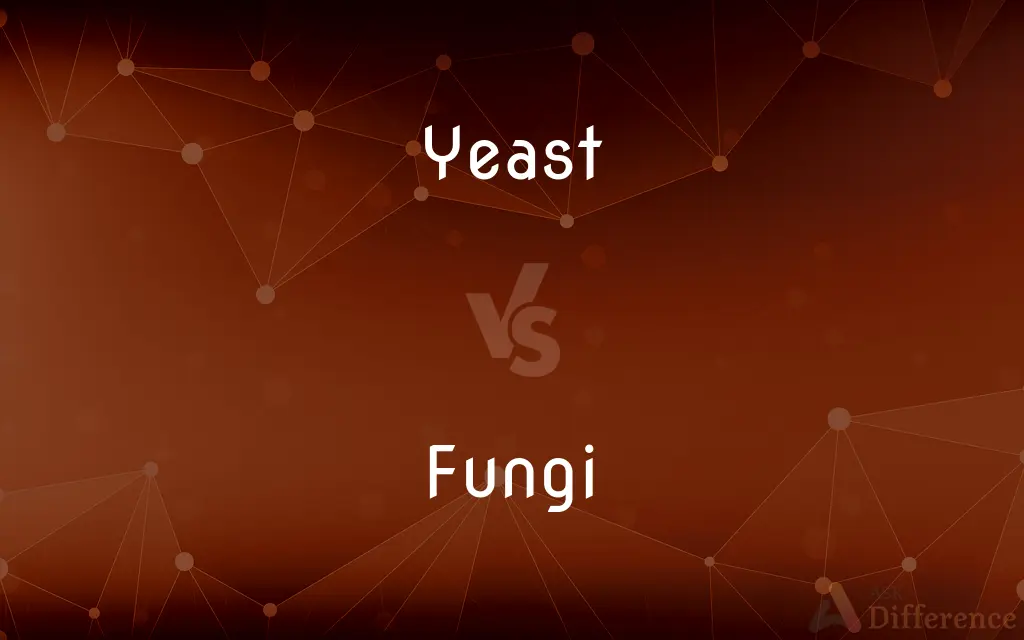Yeast vs. Fungi — What's the Difference?

Difference Between Yeast and Fungi
ADVERTISEMENT
Compare with Definitions
Yeast
Yeasts are eukaryotic, single-celled microorganisms classified as members of the fungus kingdom. The first yeast originated hundreds of millions of years ago, and at least 1,500 species are currently recognized.
Fungi
A plural of fungus.
Yeast
A microscopic fungus consisting of single oval cells that reproduce by budding, and capable of converting sugar into alcohol and carbon dioxide.
Fungi
(pathology) Spongy, abnormal growth, as granulation tissue formed in a wound.
Yeast
Any of various unicellular fungi of the genus Saccharomyces, especially S. cerevisiae, reproducing asexually by budding or sexually through the production of ascospores and capable of fermenting carbohydrates.
ADVERTISEMENT
Fungi
Alternative spelling of fungee
Yeast
Any of numerous fungi that exhibit a one-celled growth form and reproduce by budding, including certain candidas that can cause infections in humans.
Fungi
A style of folk and popular music from the Virgin Islands, traditionally performed by bands consisting of banjo, guitar, ukulele, and washboard with various percussion instruments on rhythm.
Yeast
Froth consisting of yeast cells together with the carbon dioxide they produce in the process of fermentation, present in or added to fruit juices and other substances in the production of alcoholic beverages.
Fungi
A group of thallophytic plant-like organisms of low organization, destitute of chlorophyll, in which reproduction is mainly accomplished by means of asexual spores, which are produced in a great variety of ways, though sexual reproduction is known to occur in certain Phycomycetes, or so-called algal fungi. They include the molds, mildews, rusts, smuts, mushrooms, toadstools, puff balls, and the allies of each. In the two-kingdom classification system they were classed with the plants, but in the modern five-kingdom classification, they are not classed as plants, but are classed in their own separate kingdom fungi, which includes the phyla Zygomycota (including simple fungi such as bread molds), Ascomycota (including the yeasts), Basidiomycota (including the mushrooms, smuts, and rusts), and Deuteromycota (the fungi imperfecti). Some of the forms, such as the yeasts, appear as single-celled microorganisms, but all of the fungi are are eukaryotic, thus distinguishing them from the prokaryotic microorganisms of the kingdon Monera.
Yeast
A powdered or compressed commercial preparation of yeast cells, used chiefly as a leavening agent or as a dietary supplement.
Fungi
The taxonomic kingdom of lower plants
Yeast
An agent of ferment or activity
Political agitators who are the yeast of revolution.
Fungi
(pun) the one who buys the drinks
Yeast
An often humid, yellowish froth produced by fermenting malt worts, and used to brew beer, leaven bread, and also used in certain medicines.
Yeast
A single-celled fungus of a wide variety of taxonomic families.
Yeast
A true yeast or budding yeast in order Saccharomycetales.
Yeast
Candida, a ubiquitous fungus that can cause various kinds of infections in humans.
Yeast
(figuratively) A frothy foam.
Yeast
To ferment.
Yeast
(of something prepared with a yeasted dough) To rise.
Yeast
To exaggerate.
Yeast
The foam, or troth (top yeast), or the sediment (bottom yeast), of beer or other in fermentation, which contains the yeast plant or its spores, and under certain conditions produces fermentation in saccharine or farinaceous substances; a preparation used for raising dough for bread or cakes, and making it light and puffy; barm; ferment.
Yeast
Spume, or foam, of water.
They melt thy yeast of waves, which marAlike the Armada's pride, or spoils of Trafalgar.
Yeast
A form of fungus which grows as individual rounded cells, rather than in a mycelium, and reproduces by budding; esp. members of the orders Endomycetales and Moniliales. Some fungi may grow both as a yeast or as a mycelium, depending on the conditions of growth.
Yeast
A commercial leavening agent containing yeast cells; used to raise the dough in making bread and for fermenting beer or whiskey
Yeast
Any of various single-celled fungi that reproduce asexually by budding or division
Share Your Discovery

Previous Comparison
Terrible vs. Terribly
Next Comparison
Entice vs. Tempt













































